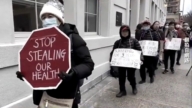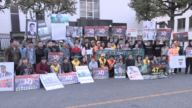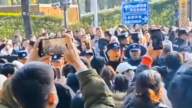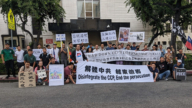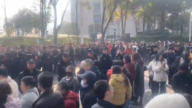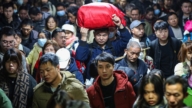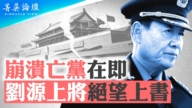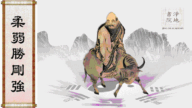【新唐人2014年12月30日讯】长期以来,中国大陆一直因为执行死刑最多、立法上死刑罪名最多、对待死刑犯手段残忍等等,遭到国际社会和人权组织的谴责。今年十月,中共当局宣布将取消包括集资诈骗罪、强迫卖淫罪在内的9项死刑罪名,再次引发了海内外有关中国死刑存废的争议。
据中共官方的数据公布,中国《刑法》自1997年修订以来,17年内已经行了9次较大的修改。在今年10月末召开的十二届全国人大常委会第11次会议上,刑法修正案(九)草案再次被提交并进行了审议。草案的主要内容之一是准备取消9个死刑罪名,一旦审议通过,中国的死刑罪名将由原有的55个,减到46个。
随着人权观念的发展,全世界大约有160个国家,都已经废除了死刑。中国不但保留死刑,而且一直因为在立法上死刑罪名较多、司法上死刑的适用频率较大、对死刑犯不人道,如摘取器官、冤假错案频发等问题而备受国际社会和人权组织的关注。国内外呼吁当局取消死刑的声音不断。因此,中国准备取消部分死刑罪名的决定公开后,得到了一些支持废除死刑人士的认可。
东南大学法学教授张赞宁:“现在当局也认识到这一点,就是杀人太多了,国际舆论以及形象也不好。那么它在逐步取消死刑罪的罪名,尽管取消的不多,我觉得还是一种进步吧,毕竟还可以少杀一点人。但是55项只取消9项,那么现在看来,中国还是死刑最多的国家。”
但很快,有声音质疑,当局打算取消的9项死刑罪名,背后藏有猫腻。据官方媒体报导,这9项准备取消死刑的罪名分别是:走私武器罪、弹药罪、走私核材料罪、走私假币罪、伪造货币罪、集资诈骗罪、组织强迫卖淫罪、阻碍执行军事职务罪,以及战时造谣惑众罪。取消这几项罪名的原因是:“这9个死刑罪名几乎没有适用或者极少适用,削减起来相对容易。”
民众纷纷在网上吐槽称,细看9项罪名,竟然都是与腐败和黑社会集团相关联的。这不是在给中共腐败官员和黑恶势力发“免死金牌”吗?
有网民指出,组织强迫卖淫罪是黑社会集团惯用的犯罪手段,通常背后都有官方撑腰,服务的对像也往往是权贵阶层,受害者则是贫苦百姓。以曾经轰动一时的“唐慧案”为例,唐慧11岁的女儿被拐骗到有官方背景的娱乐场所被迫卖淫,遭多人轮奸上百次,最终主犯只被法院判处了无期徒刑,一度引发舆论对法院量刑过轻的声讨。这样丧心病狂的罪行一旦取消了死刑,岂不是令恶人更加猖狂?
宪政学者陈永苗:“原来我们一直在争论废除死刑的时候,我们一直担心废除死刑,它一定是先废除贪官的刑,一定是废除有权力人的死刑。那么它(中共)废除这几个罪名死刑的时候,你可以看到它就符合我们的怀疑和猜测了,它不是说底层民众的一些死刑被废除的。”
也有民众针对集资诈骗罪指出,近年来集资诈骗案接连出现,背后都有中共官方的影子。利如涉及金额上千亿,造成受害人上百万,数十家公司被查封的“天津私募诈骗案”,就被知情人指称幕后黑手是天津政府。此外还有引起举国关注的曾成杰案,也被舆论普遍认为是地方政府操纵的一起“替罪羊”案。
陈永苗:“这些都是一些官方或者是有权的人才能干的到的。所以它取消了这些,可能是有利于这些既得利益集团,或者是有权力的人的轻罪化或者是无罪化,基本上给他们上边的紧箍咒给拿掉,让他们在法律之外更加没有忌惮。”
中国社会活动家胡佳则认为,中共当局取消部分死刑罪名,只是在内外双重的舆论压力下对国际社会作出一个姿态,对中国社会人权的改善不具有任何现实意义。
胡佳表示,由于司法的不透明和不公正,只要被当局认为是威胁其政权统治的对像,都可以被冠以吸毒贩毒、恐怖袭击等可以执行死刑的罪名,当前新疆的情况就最为明显。
采访/陈汉编辑/张天宇 后制/舒灿
CCP to End 9 Death Penalties—But Who will Have Amnesty?
For a long time, mainland China has been frowned upon by
the international community and human rights organizations
for having the most death penalties, the most death charges
and the cruellest treatment on death row prisoners.
In October, the Chinese Communist Party (CCP) announced
that they were getting rid of nine of their death charges,
including fund-raising fraud, forced prostitution, and others.
This once again, sparked the controversy on the abolition of
the death penalty in China and worldwide.
The CCP’s official data shows that, since their Criminal Law
was amended 17 years ago in 1997, they have made another
nine revisions, the last being in October 2014, in the meeting
of the Standing Committee at the 12th National People’s
Congress (NPC).
One of the main elements in the amendment draft
is the abolition of nine death penalty charges.
If it passes the NPC review, China’s death penalties
will be reduced to 46, from the original 55.
With the development of human rights worldwide,
about 160 countries have abolished the death penalty.
But China is not one of them—it has attracted the attention
of the international community and rights organizations
over its high number of death penalties, its frequency of
death charges, and its inhumane treatment of death row
prisoners, such as organ harvesting, injustice of rights, etc.
The call for abolishing the death penalty has never stopped
both within China and abroad.
China’s decision to at least end some of its death charges
has gained some support.
Zhang Zangning; Law Professor, Southeast University:
“The authorities now recognize that killing so many prisoners
causes a negative impression of the CCP and China
from the international community."
“So the CCP has started to gradually abolish death charges;
although limited, I think it’s still one sort of progress,
less people will be killed after all."
“But with only nine out of 55 charges being removed,
China still has the largest number of death penalties."
But some are questioning the real motives behind the CCP’s
cancellation of the nine charges.
According to official media, the nine death penalties being
abolished are: the smuggling of weapons and ammunition,
smuggling nuclear materials, money counterfeiting,
smuggling of counterfeit money, fraud in raising funds,
organized forced prostitution, hindering the performance of
military duties, and the spreading of rumors on war crimes.
And the reason given for cancelling these charges are that
they are “never or rarely applicable, so ending them is easy."
Netizens commented online that if you have a careful look
at the nine charges, they are all associated with the mafia.
So was this decision actually made to let off
the corrupt officials and evil forces of the CCP?
Some netizens say that forced prostitution is a conventional,
organized crime by the underworld group, which is generally
supported by the official forces.
The customers of forced prostitution are usually
the elite, but the victims are poor people.
Taking the infamous Tang Hui case as an example, Tang Hui’s
11-year-old daughter was abducted to an entertainment
building with official background, forced to be a prostitute,
and gang-raped several hundred times.
The main culprit was only sentenced to life imprisonment,
leading to public condemnation against the light sentence.
Once the death penalty for such a crime is abolished,
will it become more rampant?
Chen Yongmiao, Constitutional Scholar: “Previously when we
debated on the abolishment of the death penalty in China,
we were worried that the government will first abolish the
death penalty for the corrupt officials and those with power;
so now you can see that this confirms our suspicion
and speculation—the death penalties related to the lower-
class people have not been abolished."
Some netizens say the recent wave of fund-raising fraud
is related to the official agencies of the CCP.
For example, the Tianjin private fraud which involved
hundreds of billions of yuan and millions of victims,
and caused dozens of companies to close down was alleged
by insiders to be run by the Tianjin Municipal Government.
The Zeng Chengjie case also raised nationwide concern;
it’s generally considered to have been manipulated by
the local government and regarded as a ‘scapegoat’ case.
Chen Miao: “These crimes that are being abolished can only
be committed by persons with official backgrounds or power,
so to end these penalties will benefit that interest group by
lightening or erasing their criminal sentence; they will not
fear anything since they’re beyond the law."
Chinese activist, Hu Jia believes that the CCP is ending the
nine penalties just to make a gesture to the international
community under the pressure of public opinion both inside
and outside China, and has no practical significance for China
in improving its human rights.
Hu Jia says that due to the lack of transparency and justice
in the judicial system, if the authorities consider any person
a threat to its regime, that person will be labelled with
drug offenses like drug trafficking, or terrorist attacks,
which will lead to a death penalty—the current situation in
Xinjiang being the most obvious.
Interview/ChenHan Edit/Zhang Tianyu Post-Production/ShuCan


